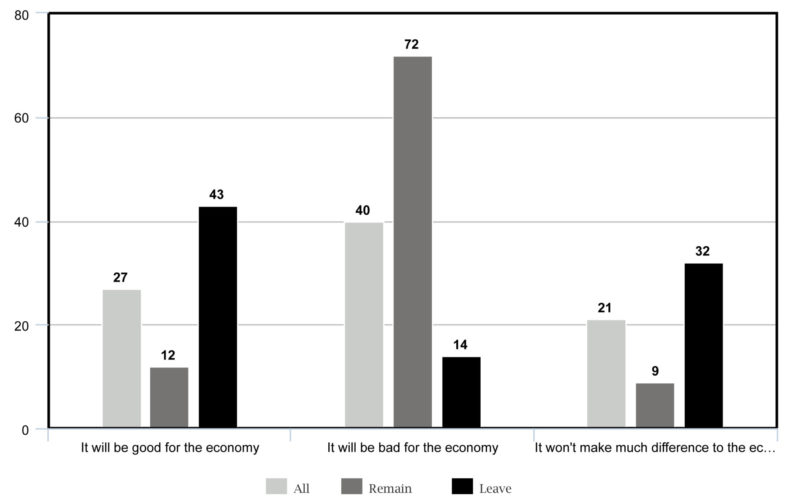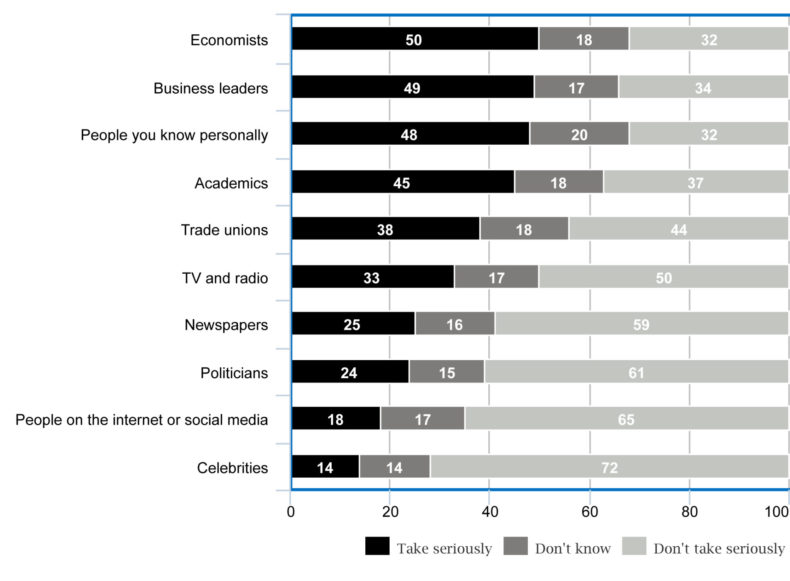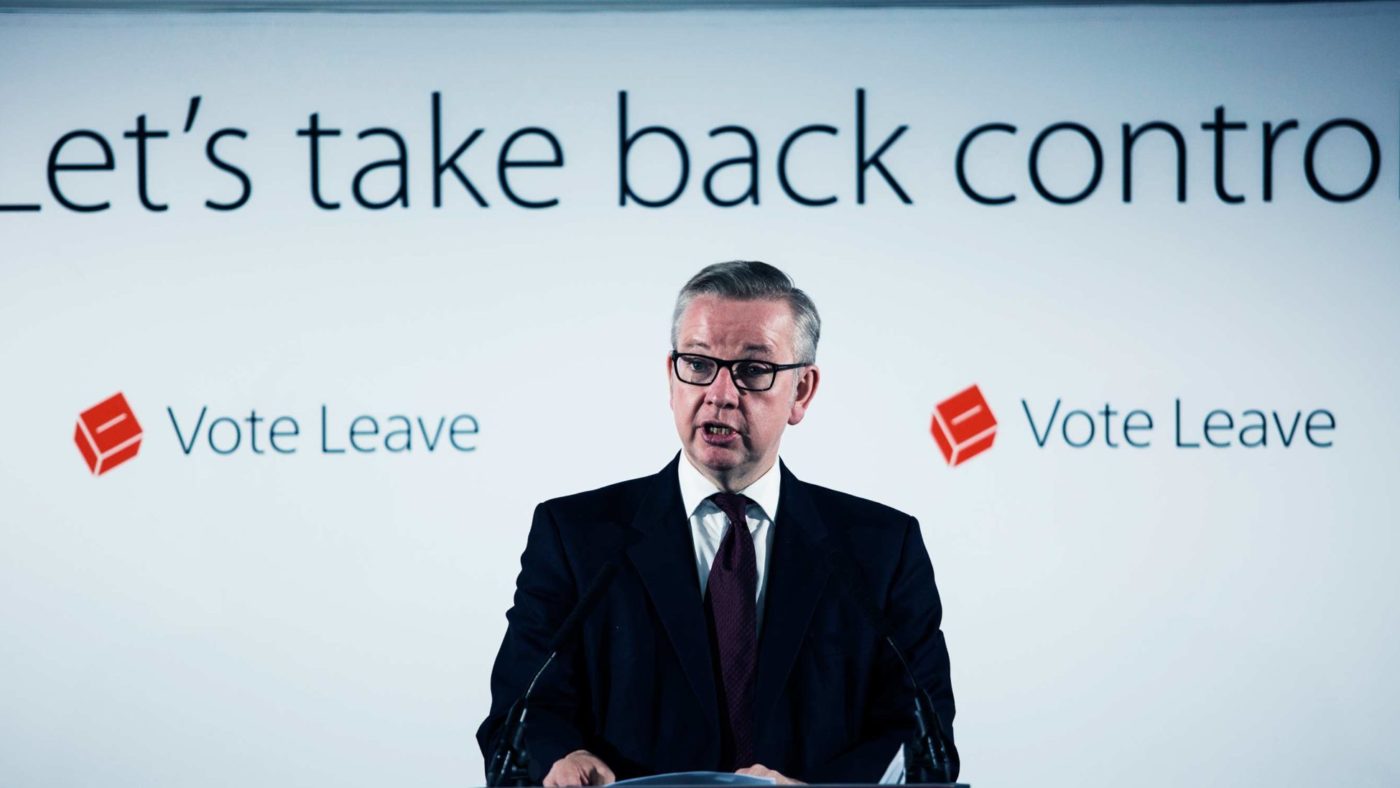So far our series of polling into the big economic and political questions has studiously avoided direct polling of the issue of the day.
But voters’ views on Brexit are can predict their views on other subjects. We found, for example, that Leavers were much likelier than Remainers to have protectionist views on trade policy, and the divide is also a useful proxy for a number of cultural issues.
But what about attitudes towards experts? After all, Michael Gove once claimed that “the people of this country have had enough of experts from organisations with acronyms saying that they know what is best and getting it consistently wrong”. But who thinks what, and which experts (and indeed non-experts) do people take seriously on the economics of Brexit?
First of all, we asked people what effect, if any, they thought Brexit will have on the UK’s economy. Forty per cent thought it would be bad, 27 per cent that it would be good, and 21 per cent that it wouldn’t make much difference, with 13 per cent unsure.
As you would expect, Remainers and Leavers feel very differently. Those who voted against Brexit in 2016 are six times likelier to think it will be bad (72 per cent) than good (12 per cent) with nine per cent expecting no difference. Those who backed leaving are more divided between good (43 per cent) and no difference (32 per cent) with only 14 per cent expecting Brexit to be bad for the economy.

We then asked people, when thinking about what effect Brexit might have on the UK’s economy, how seriously they take the views of ten different types of people and media that might express an opinion.
None of the options was taken seriously by a majority. Half (50 per cent) said they took economists’ views seriously – the highest percentage for any category – with 32 per cent not taking them seriously. Business leaders were statistically indistinguishable on 49 per cent seriously, 34 per cent not seriously, and academics also fared well on 45 per cent seriously, 37 per cent not.
For each of these areas of expertise, Remainers were about twice as likely as Leavers to take them seriously. But given the balance of opinion among economists, business leaders and academics, it is also notable that around one in three Leave voters do take them seriously – fewer than the number of Leavers who don’t, but a substantial minority nonetheless.
Some Remainers have argued that the broadcast media created a false sense of the balance of opinion within these professions, while some Brexiteers have argued that many people voted Leave on principle irrespective of the economic consequences. For a number of reasons, neither claimed effect is easy to quantify.
The media itself fares poorly in our poll, with a third (33 per cent) taking TV and radio seriously on Brexit economics and a quarter (25 per cent) saying the same about newspapers, while 50 per cent and 59 per cent respectively said the reverse.
It’s been suggested that Brexit-supporting parts of the press, and even some broadcasters had a decisive role in the 2016 result. But we found that it was in fact Remainers who were likelier than Leavers to take the media seriously, whether over the airwaves (42 per cent seriously, 45 per cent not seriously among Remainers; 25-60 among Leavers) or in print (29-58 with Remainers; 20-66 with Leavers).

Where Remainers and Leavers do agree is on trusting people they know personally. Nearly half (48 per cent) of eligible voters take their friends and acquaintances seriously on this issue, with zero difference by referendum vote. Likewise, people “on the internet or social media” weren’t taken seriously by either (overall 18 per cent seriously, 65 per cent not), although within each camp there was a notable age difference.
Trade unions’ views were taken seriously by 38 per cent, with 44 per cent saying they don’t take them seriously. It was interesting that the difference between Remainers and Leavers (the former were twice as likely as the latter to take union views seriously) was as big as the gap between Labour and Tory voters.
You might have expected politicians to be somewhere near the bottom of the list, and you’d be right. Twenty four per cent take them seriously on the economic impact of Brexit, including 31 per cent of Remainers and 17 per cent of Leavers. Sixty-one per cent of eligible voters don’t take their views seriously.
However the group whose views taken least seriously of all are celebrities. Fourteen per cent of eligible voters take their views on the economic impact of Brexit seriously, while almost three-quarters (72 per cent) don’t. And while there was a modest difference between Remain (17 seriously, 71 per cent not) and Leave voters (9-81), it does seem as though celebrities have done the impossible, and got the two sides largely to agree on something.


